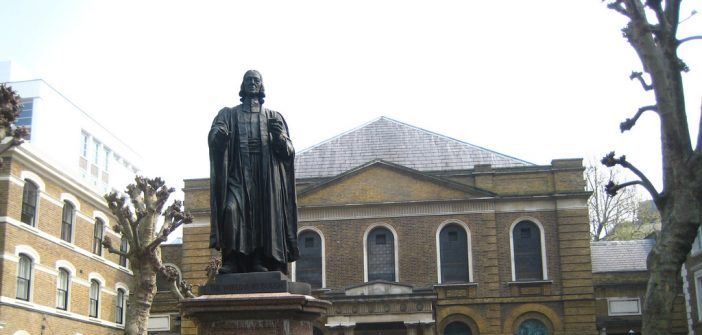
Let me preface what I’m about ready to share with a little background. When I made a decision to follow Jesus back in high school, it was largely due to the ministry impact of a United Methodist Church. Since then, I’ve attended Methodist churches. I’ve worked for a Methodist church. And, in my role with The Unstuck Group, I continue to have the opportunity of serving many Methodist churches.
Don’t tell my Baptist friends this, but my theology is actually more closely aligned with Wesleyan theology that’s the foundation of Methodist churches. That said, I still do believe that there will be some Baptists in Heaven. :)
In the coming days, the United Methodist Church leadership will be gathering from all parts of the world in Portland. Most of you haven’t heard about this gathering which happens every four years, but I’m quite confident the proceedings will make national news. Ironically, the topics that they’ll be addressing in Portland have divided the “united” Methodists.
In my opinion, though, the issues that are really impacting the longterm health of Methodist churches will not be addressed in Portland. There are several significant systemic problems within the denomination that create barriers for churches to experience health and growth. From my perspective working with Methodist churches across the country, here are a handful of those broken systems:
Ordained pastors are guaranteed appointment regardless of their effectiveness.
Tenured teachers are about the only other profession I know of where you can perform poorly and still be guaranteed a job. Same holds true for Methodist pastors. What that means, of course, is that the struggling churches where leadership is most needed are likely getting those whom are least qualified to lead change.
Healthy churches are funding the dead and dying churches.
It would be one thing if we were just robbing from the rich to give to the poor. In this case, though, we’re talking about lives transformed by Jesus Christ. Instead of investing in the ministries that are seeing more people become Christ-followers and experience life change, the United Methodist apportionment system is designed to take money…lots of money…from the healthy, growing churches.
I’ve encountered instances where churches are required to contribute several hundreds of thousands of dollars to the denomination. One church I know of was asked to contribute more than 20% of its annual budget. No business would survive by financially penalizing the healthy, growing business units while subsidizing the dead and dying portions of the business.
Because the denomination owns the buildings, it creates a disincentive to pay down debt.
That’s right. The local congregation builds the buildings and funds the construction projects. Once construction is complete, though, the building doesn’t belong to the congregation. Instead, ownership shifts to the denomination. That means if a large congregation leaves the denomination for any reason, the denomination has a building and all the debt but no congregation to support the debt service payments.
Because of this, it’s not unusual for larger Methodist churches to retain significant amounts of debt. With that debt, they have more leverage with the denomination should they decide they need to leave but want to retain the building. Here’s one example of how that played out. It’s a convoluted mess.
The requirement to establish separate committees for personnel, finances and facilities perpetuates leadership dysfunction.
For small churches where everyone knows everyone, this isn’t as big of an issue. As churches grow into the hundreds and thousands, though, this turns into a decision-making nightmare for several reasons.
Ministry can come to a grinding halt as staff and lay leaders try to figure out what committees have to come together to approve what decisions. Because these committees have shared authority, one committee can essentially veto the initiatives they don’t support. Professional staff are stuck waiting for volunteer lay people to make decisions that volunteers are often less informed to make.
Though there’s some freedom within denominational rules to modify this structure, lay leaders have to support the changes in consultation with denominational leaders. If you’ve ever had to change the bylaws of your church in the past, you know that’s not exactly an easy transition, especially if you have people who are trying to maintain control.
I’m a big believer in the power of unity, but what the United Methodist Church is experiencing may be an instance similar to Paul and Barnabas where it’s appropriate for churches to go their separate ways. Regardless of what happens in Portland, my hope is that eventually the denomination will address some of these systemic issues which are creating barriers for churches to experience health, growth and ultimately Kingdom impact.
I asked a few trusted United Methodist pastors to weigh in on this article before I decided to share it. One had some additional thoughts I thought were worth sharing:
While I certainly agree with all the points, I believe (and I’m sure you agree), there are some even deeper issues regarding our confused and anemic state than the structural and alignment issues you address, which also need to be addressed:
- No clear unity around the centrality and authority of Scripture as our rule and guide.
- A lack of memory or practice of our ministry practices that John Wesley and the early Methodists initiated (such as Classes, Bands, and Societies) that helped to take a revival movement and turn it into a systems dream team.
- And a lack of fervor over the reality that we didn’t start as a denomination, but rather as a fiery and passionate movement with an unstoppable evangelical heartbeat for the poor, marginalized and oppressed who had been neglected by the Church of England of Wesley’s day.
The denomination, like other mainline protestant denominations, is battling decades of decline. My hope is that the United Methodist Church will embrace new vision and “methods” to have impact in a new day. Unfortunately, hope is not a strategy. I think the institution is now too big not to fail.
In the meantime, I’ll do everything I can do to help local Methodist churches work within the limitations of the system to experience health and growth. I do love a good challenge.





